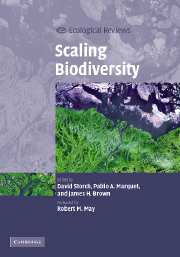Book contents
- Frontmatter
- Contents
- List of contributors
- Foreword by Robert M. May (Lord May of Oxford)
- Preface
- 1 Introduction: scaling biodiversity – what is the problem?
- PART I Spatial scaling of species richness and distribution
- PART II Alternative measures of biodiversity: taxonomy, phylogeny, and turnover
- PART III Scaling of biological diversity with energy and the latitudinal biodiversity gradient
- 11 Climate and diversity: the role of history
- 12 Inverse latitudinal gradients in species diversity
- 13 Regional-to-global patterns of biodiversity, and what they have to say about mechanisms
- 14 Recasting the species–energy hypothesis: the different roles of kinetic and potential energy in regulating biodiversity
- 15 Scaling species richness and distribution: uniting the species–area and species–energy relationships
- PART IV Processes, perspectives, and syntheses
- Index
- Plate section
- References
13 - Regional-to-global patterns of biodiversity, and what they have to say about mechanisms
Published online by Cambridge University Press: 05 August 2012
- Frontmatter
- Contents
- List of contributors
- Foreword by Robert M. May (Lord May of Oxford)
- Preface
- 1 Introduction: scaling biodiversity – what is the problem?
- PART I Spatial scaling of species richness and distribution
- PART II Alternative measures of biodiversity: taxonomy, phylogeny, and turnover
- PART III Scaling of biological diversity with energy and the latitudinal biodiversity gradient
- 11 Climate and diversity: the role of history
- 12 Inverse latitudinal gradients in species diversity
- 13 Regional-to-global patterns of biodiversity, and what they have to say about mechanisms
- 14 Recasting the species–energy hypothesis: the different roles of kinetic and potential energy in regulating biodiversity
- 15 Scaling species richness and distribution: uniting the species–area and species–energy relationships
- PART IV Processes, perspectives, and syntheses
- Index
- Plate section
- References
Summary
Introduction
One of the most striking patterns in ecology is broad-scale variation of species richness (e.g. Fig. 13.1). Ecologists have noted these patterns for at least two centuries (von Humboldt & Bonpland, 1807; Wallace, 1878). Since then, geographical patterns of diversity have been extensively documented (see references in Table 1 in Hawkins et al., 2003a) and numerous reviews and textbooks have discussed factors hypothesized to have generated them (Huston, 1994; Rosenzweig, 1995; Chesson, 2000).
Two distinct points of view have characterized this discussion. The first, I would characterize as the multiple substituting influences family of hypotheses. According to this view, a wide variety of factors influence richness in very context-specific manners. The second view, I will call the strong constraint family of hypotheses. These hypotheses propose that, as in physical systems, a small number of general principles exert strong constraints on the behavior of ecological systems. Thus, the propensity (sensu Popper, 1990) of ecological systems to behave in particular ways can be related to one, or a small number of variables, while the rest of the world's complexity adds a bit of noise.
To reveal my own prejudice, I believe that the goal of science is to develop predictive models of the behavior of natural systems (Peters, 1991; Rigler & Peters, 1995). A search for strong propensities, perhaps reflecting strong constraints, is a logical way to begin to approach this goal.
- Type
- Chapter
- Information
- Scaling Biodiversity , pp. 258 - 282Publisher: Cambridge University PressPrint publication year: 2007
References
- 9
- Cited by

